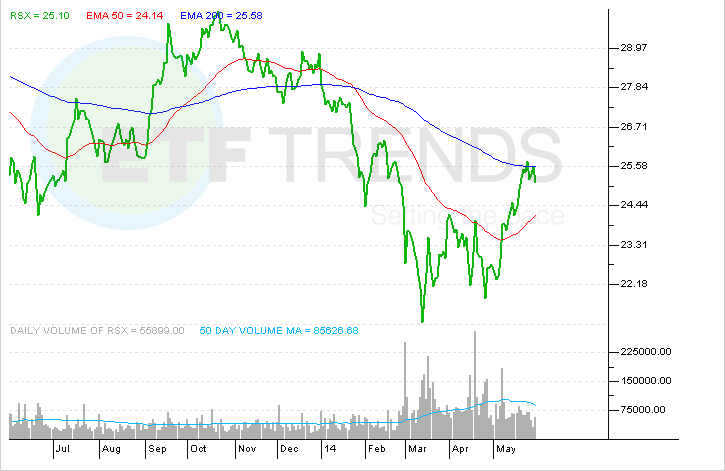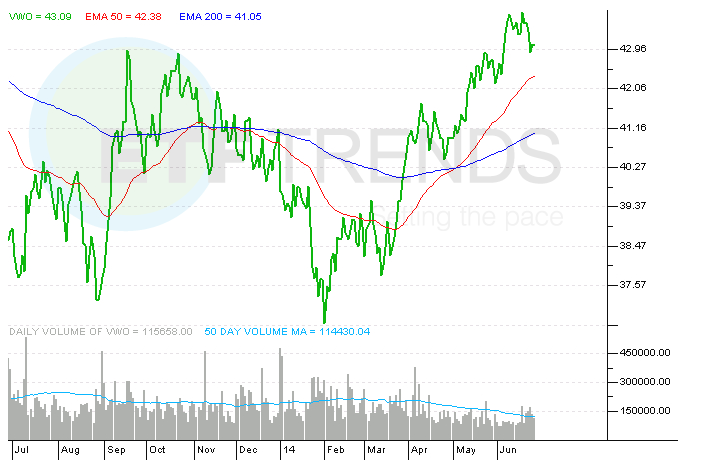Will The RussiaUkraine Natural Gas Truce Warm Up Russia ETFs
Post on: 16 Март, 2015 No Comment

After months of intense negotiation, Ukraine and Russia have finally decided to make a pact at least to resolve the ongoing natural-gas battle. A deal has finally been signed by Russian Energy Minister, Alexander Novak, his Ukrainian counterpart, Yuri Prodan and the European Union (EU) to resume natural gas supplies halted by Russia in June.
However, Ukraine will first have to clear all its outstanding dues and also make upfront payments for future gas deliveries for the deal to be effective. This will require Ukraine to pay $3.1 billion to settle some of its previous debts, as well as make an additional payment of $1.5 billion for deliveries of gas for November and December. This is believed to be funded by the International Monetary Fund (IMF) (read: Guide to Russia ETF Investing ).
The deal is quite significant given the fact that the EU relies on Russia for more than a third of its gas imports, the majority of which is piped through Ukraine. The deal brings relief to thousands of Europeans who were earlier threatened to go without enough heating this winter. Some believe that the deal might mark the beginning of new relations between EU, Russia and Ukraine.
The energy deal, however, failed to provide the much needed boost, with most of the Russian ETFs still trading either flat or in the red following the deal’s closure on Oct 30. Most of the ETFs in the space including Market Vectors Russia ETF ( RSX ETF report ), iShares MSCI Russia Capped ETF ( ERUS ETF report ) and Market Vectors Russia Small-Cap ETF ( RSXJ ETF report ) have shed more than 1% this week (read: Russia ETFs Crumble on New Sanctions, What Lies Ahead? ).
Also, these products have been the worst performers in the international arena this year, having lost in excess of 20% in the past one year due to the ongoing conflict. The graph below clearly highlights the downtrend in the above three Russian products for the past one year.
Is There Any Hope?
Though the recent deal failed to ignite the Russian ETFs, these products have willy-nilly seen huge inflows in the past two months, as per etf.com. Investors have poured more than $630 million into RSX in the past two months lured by cheap valuations in the emerging market space.
Moreover, there seems to be some bottom-fishing at work as well. Many are speculating that Russian stocks will recover somewhat amid signs that the seven-month conflict in Ukraine is easing (read: 3 Russia ETFs at Bargain Prices Right Now ).

Though many view the deal as a positive start after months of a long and bitter conflict between the East and the West, one shouldn’t forget that the EU is yet to lift the sanctions it has imposed against Russia. The U.S. and EU have already imposed a host of sanctions on Russia’s all-important energy, banking and defense sectors to punish Russia for its annexation of the Crimea.
Most recently the U.S. tightened the maximum credit duration for Russias biggest bank – Sberbank – as well as five other banks, apart from blocking the assets of five Russian defense firms. Among others, the EU has also banned three major oil firms from raising long-term debt from the European capital markets (read: Inside the Surprising European ETFs Surge ).
The sanctions have been harsh enough to raise concerns about Russia’s long-term economic slowdown. The Russian economy is expected to slow to 0.3% growth this year – the weakest since 2009 and might even slip into recession for a year or two. Both the rating agencies – Standard and Poor’s and Moody’s – have a negative outlook on Russia on dwindling foreign reserves and declining oil prices.
Thus, we might not see any long-term improvement in Russian ETFs unless Russia manages to improve its relations with the U.S. and EU. A reversal of the long list of sanctions imposed on Russia by the West can only bring relief to the Russian economy. Further, all the three above mentioned funds have a Zacks ETF Rank of 4 or ‘Sell’ rating, suggesting that more pain lies ahead and that they might continue to underperform in the months to come.
Want the latest recommendations from Zacks Investment Research? Today, you can download 7 Best Stocks for the Next 30 Days. Click to get this free report














